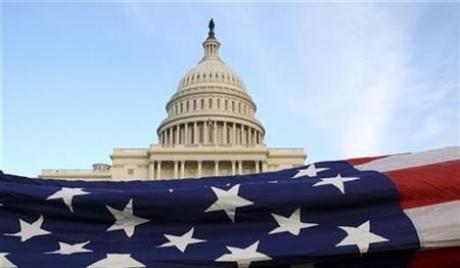E.U. Sees U.S. "Disappearing" As Partner On Climate
Date: 09-Nov-10
Country: CHINA/BELGIUM
Author: David Stanway and Pete Harrison

A U.S. Flag is displayed in front of the U.S. Capitol during a Flag
Ceremony hosted by the Tea Party Patriots in Washington, November 2,
2010.
Photo: Reuters/Molly Riley
The European Union sees the United States "disappearing as a partner" in international climate talks after President Barack Obama suffered setbacks in midterm elections, the EU's top climate official said on Friday.
Obama has conceded that big Republican gains in Tuesday's elections undermined prospects for comprehensive legislation to tackle climate change.
"We're very disappointed about the United States going that way and dropping climate legislation," said Jos Delbeke, director general of the European Commission's climate team.
"We see the U.S. disappearing as a partner in achieving meaningful climate action," he told Reuters in a telephone interview from Beijing.
Obama's election in 2008 and his talk of saving a "planet in peril" briefly encouraged some countries to anticipate significant progress in talks on a new U.N. treaty to slow rising emissions of greenhouse gases.
The U.S. election results have dented the few remaining expectations for a significant result at the next climate talks in Cancun, Mexico, from November 29-December 10.
Obama said at last December's Copenhagen summit that he wanted to cut U.S. emissions by 17 percent below 2005 levels by 2020, a cut passed by the U.S. House of Representatives but not by the Senate.
"We wonder how they can achieve their 2005 commitments without going for a cap and trade scheme," said Delbeke. "It will make it even more problematic for international climate negotiations."
Cap and trade schemes cap carbon emissions by power plants and factories by issuing a fixed quota of emissions permits which companies can trade among themselves.
The U.S. reluctance to curb planet-warming emissions may also hit plans to raise a promised $100 billion a year by 2020 to help poor nations cope with climate change.
That plan partly hinges on curbs on emissions to push up the price of carbon in mechanisms such as the EU's Emissions Trading Scheme.
But Delbeke remained upbeat that the Cancun talks could achieve something.
"Cancun can still deliver, for example decisions on adaptation and deforestation, while progress should be made on the monitoring, reporting and verification question, but beyond that, the outlook is worrying."
BORDER TARIFFS
If countries such as the United States continue to avoid climate cuts, while the EU keeps making its industry pay for permits to emit carbon dioxide, trade imbalances will start to occur. Some EU companies are already calling for border tariffs to be slapped on imports to restore the balance.
"In the long term that may be a possibility," Delbeke told reporters at a briefing in Beijing earlier in the day.
"If we live in a world where the EU is the only one that has made a commitment and the U.S. is doing nothing, and other countries including China are doing nothing, then we would have a problem and I see this debate coming up. So far we have been holding back," he said.
"If China were to implement a cap and trade system that would be extremely helpful to help prevent such trade mechanisms coming into place." He praised China's progress so far on cap and trade.
Delbeke also warned the fast-growing economy against misrepresenting its circumstances in climate talks.
"China is an emerging economy, is behaving like an industrial nation in many respects, and cannot use the song of developing countries to dress up its negotiating positions," he said.
That is a big issue for Europe's poorer nations, which protest against EU demands they help finance greening China's economy when the wealth per capita of Romania, for example, is much lower than that of Beijing.
(Editing by Rex Merrifield and Keiron Henderson)